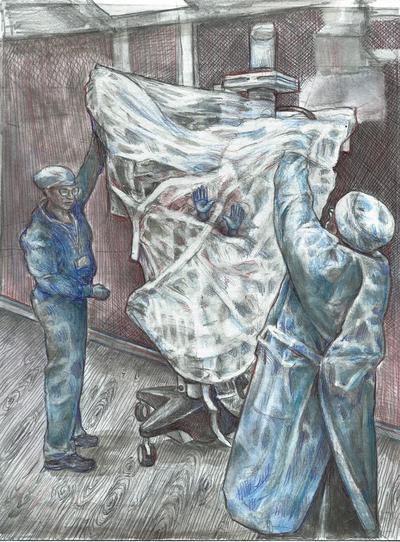Liferaft Goggles
By
Helen Snell
2012
Helen Snell
Neoreplicants brings together the results of a partnership between Exeter Phoenix’s annual Digital Art
Commission and the University of Exeter’s Centre for Additive Layer Manufacturing (CALM). This opportunity
gave thirty South West based visual artists the chance to explore the possibilities offered by the emerging
technologies of 3D printing to their art making practice.
Given training and access to CALM’s facilities, artists were able to create objects in computer modeling software,
that were then printed through a process of laser sintering - whereby granules of a densely packed nylon powder
material are welded together by laser, layer-by-layer.
This rapidly developing industrial design technology opens possibilities to create, replicate and adapt complex
objects (including bespoke replacement body parts and prosthetics), sharing 3D files on the internet and printing
them in a variety of materials. It immediately raises allusions to the utopian/dystopian technologies of science
fiction, many now on the cusp of becoming science fact. New possibilities too are inevitable for the creation of art,
both as a fabrication technique and as a way to visualise and make tangible the (often abstract) digital information
that is ever more pervasive in our lives.
The need for invisibility and silence at all cost in modern warfare and the cowardly advantage of subterfuge has been the inspiration for this piece.
My 3d print design is for counter intuitive night vision glasses, thus highly visible like search lights or the beam of a light house, looking for victims to save as opposed to searching out able bodied targets for extermination.
Each eye or piece disc represents a placenta - life raft hybrid. Each figure/foetus on the life raft wears a life jacket. Tubes criss-cross through the design to keep everyone attached to a life line and buoyancy, like embryos.
Since the build of the model is in layers I wanted to use the aesthetics of layering within the design rather than trying to hide it.
I was interested in application of 3d printing in orthopedic surgery to create bespoke prostheses such as facial implants. Sci –fi scenarios proliferated in my imagination.
Helping Artists Keep Going
Axis is an artist-led charity supporting contemporary visual artists with resources, connection, and visibility.




